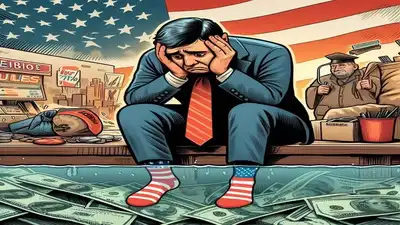American consumer confidence in the economy has dropped to its lowest level since the onset of the Covid-19 pandemic. The Conference Board reported a sharp 7.9-point decline in April, bringing the index down to 86, marking the lowest reading since May 2020.
The decline is being largely attributed to growing concern over tariffs imposed by President Donald Trump’s administration, which have included a 10 per cent levy on most imports and a steep 145 per cent tariff on Chinese goods, along with duties on steel, aluminium and automobiles.
Nearly one-third of consumers now expect a slowdown in employment—levels not seen since April 2009 during the Great Recession. An Associated Press-NORC Center survey also found that around half of Americans are worried about a potential recession.
“Rattled consumers spend less than confident consumers,” said Carl Weinberg, chief economist at High Frequency Economics. “If confidence sags and consumers retrench, growth will go down.”
The index measuring short-term expectations for income, business conditions and employment dropped 12.5 points to 54.4—its lowest in over 13 years and far below the threshold of 80, which often signals a looming recession.
The largest drops in confidence were seen among Americans aged 35 to 55 and those earning more than $125,000 annually.
Also read: US job openings drop to 7.2 million in March amid tariff-driven uncertainty
Market volatility has contributed to the downturn in sentiment, with the S&P 500 down 6 per cent for the year, the Dow Jones falling 5 per cent, and the Nasdaq declining by 10 per cent in 2025 despite recent recoveries.
Spending intentions have weakened across the board. Fewer Americans are planning to purchase homes or cars, amid high mortgage rates and property prices. Overseas vacation planning has dropped from 24.1 per cent in December to 16.4 per cent in April. Restaurant spending plans also saw a historic decline.
The US government is set to release its report on first-quarter economic growth on Wednesday, with economists projecting a notable slowdown following a robust holiday spending season. Meanwhile, Friday’s Labor Department report is expected to reflect continued job growth, although some analysts anticipate a marked dip in hiring.
Consumer expectations of a downturn within the next 12 months have reached a two-year high.


